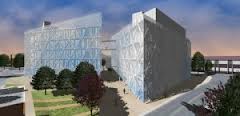
Delaware State University in Dover, has broken ground on its new four-story, 70,000-square-foot Optical Science Center for Applied Research. The OSCAR building was funded, in part, by a $10 million grant from the state. The initial phase of the construction will include advanced optical laboratories for research in wet chemistry, nanochemistry, and microscopy.
Cheyney University in Pennsylvania recently open its Living and Learning Community dormitory which houses nearly 400 students. It is the first new building on the Cheyney campus in more than 30 years. The modular building was trucked onto campus in large sections and assembled. The $50 million building was financed largely by the Pennsylvania State System of Higher Education.
Students who live in the building are clustered according to their major to foster the creation of study groups. Each floor has laundry facilities, lounges, and meeting rooms. The suite-like dormitory rooms have microwaves and refrigerators and each suite has its own bathroom.
The new dormitory will not be the newest building on campus for long. A new science building is currently under construction.
Meharry Medical College in Nashville, Tennessee, recently broke ground on the Cal Turner Family Center. The 80,000-square-foot building is the largest new construction project on campus in the past 30 years. The center will feature a 500-seat auditorium, a ballroom, classrooms, study spaces, a food court, and a visitor’s center. The $25 million project is named in honor of Cal Turner Jr. the former CEO of Dollar General stores who contributed $3 million to the project.
New student housing is also being built on campus and medical and dental simulation centers are being constructed where students will be able to digitally experience personal care and hospital procedures.
Johnson C. Smith University in Charlotte, North Carolina, has begun construction of a new 62,000-square-foot Science Center. Funded by a $25 million grant from the Duke Endowment, the new center will house programs in medical informatics, renewable energy, bioinformatics, cyber security, and robotics, among others. The new center will allow the university to increase enrollments of students in STEM fields from 300 to 450 by 2016.

